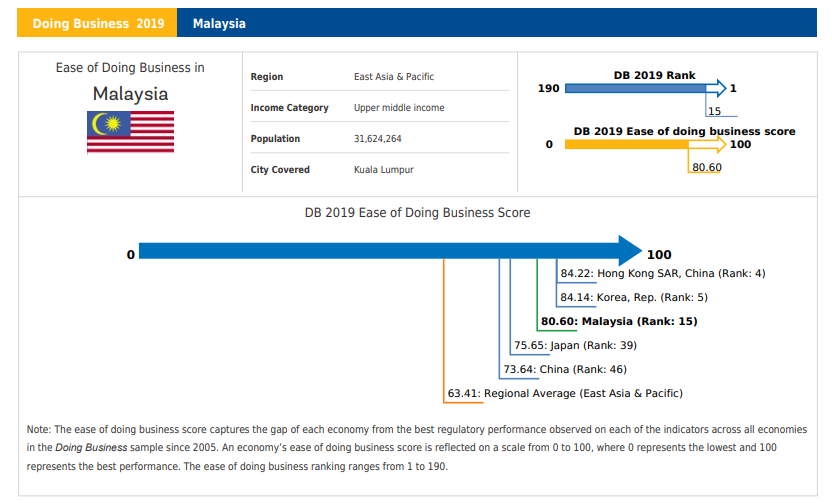
In the latest edition of the World Bank Group’s Doing Business 2019: Training for reform report, there was a peak in reform activity with 128 economies undertaking a record total of 314 business reforms. The numbers show that countries must sustain their best possible pace of reforms in order to stay competitive. Malaysia has done just that.
With a record of six business reforms carried out in the past year, the country made a significant jump to a global rank of 15 th in the ease of doing business global rankings.

Now a top global performer in the rankings, Malaysia’s business reforms demonstrate the country’s commitment to improving its business climate, thus sending important signals to the global business community and further encouraging local entrepreneurs to launch their businesses and create jobs in Malaysia.
We look back at the six reforms that have contributed to a breakthrough year for the country:- Starting a business was made easier and faster by introducing an online registration system for Goods and Service Tax (GST), reducing the time it usually takes to start a business by 10 days.
- The process of obtaining a building permit was streamlined, reducing the time for a business to complete all required procedures to build a warehouse by 24 days.
- Getting electricity was made easier by eliminating the site visit for new commercial electricity connections, reducing the length of this process by seven days.
- Property transfers were made simpler by implementing an online single-window platform to carry out property searches.
- Trading across borders was made more accessible by introducing electronic forms and enhancing risk-based inspection systems. Importing and exporting was also made easier by improving the infrastructure and port operation system at Port Klang. As a result, the time usually taken to complete border compliance requirements were significantly reduced.
- Resolving insolvency was made easier by introducing reorganization procedures for commercial entities as an alternative to liquidation.
- As the third global performer in the dealing with construction permits indicator with only Hong Kong SAR, China and Taiwan, China ahead.
- Fourth globally for the getting electricity indicator. As such, the cost for businesses to obtain a commercial electricity connection in Malaysia is only 26% of income per capita, whereas the regional average is 625%.
It is important for Malaysia to improve areas where entrepreneurs still experience obstacles. Some key challenges for the country include:
- In the area of starting a business, it is still relatively cumbersome for local entrepreneurs to do so.
- Despite reforms in how businesses pay taxes in the earlier years, the total tax and contributions rate in Malaysia at 39.2%, is higher than the regional average of 33.5%. Additionally, it takes on average 188 hours per year for businesses to prepare, file and pay taxes, which is still significantly longer than other regional comparators like Hong Kong SAR, China.
This is an enormous task for governments across the globe to cultivate an enabling environment for continued growth and development. With sound and efficient business regulation, these can be extremely beneficial for entrepreneurship ecosystems and a thriving private sector.


Join the Conversation